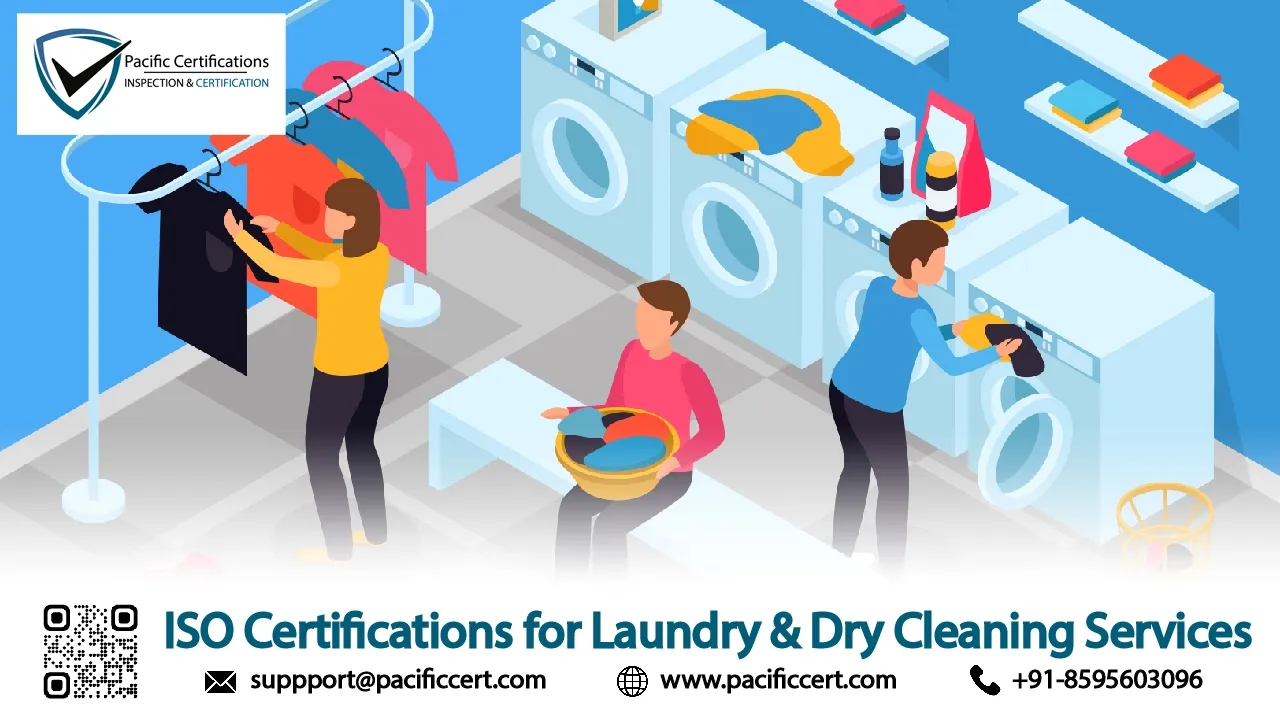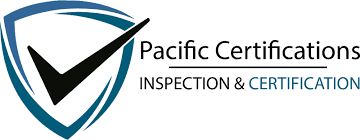ISO Certifications for Laundry and Dry Cleaning Services

Introduction
Laundry and dry cleaning businesses are essential for both households and industries such as hospitality, healthcare, and manufacturing. As customer expectations rise, service providers must ensure quality, hygiene, and sustainability throughout their operations.
According to Allied Market Research, the global laundry and dry-cleaning services market is expected to reach USD 180 billion by 2030, driven by urbanization, growing hospitality demand, and the shift toward eco-friendly washing technologies.
Adopting ISO certifications helps laundries and dry cleaners establish globally recognized systems for quality control, environmental protection, worker safety, and energy efficiency, ensuring trust and long-term customer loyalty.
Clean clothes are good business — clean processes are even better. ISO certification helps laundries deliver both — Pacific Certifications
Quick Summary
ISO certifications such as ISO 9001, ISO 14001, ISO 45001, ISO 50001, and ISO 26000 help laundry and dry-cleaning businesses ensure consistent quality, safety, and sustainability. These standards enhance service reliability, reduce waste and energy consumption, and build credibility among clients in hospitality, hospitals, and retail sectors.
If you are looking for ISO Certification for your Laundry Service, get in touch with us at [email protected].
Applicable ISO Standards for Laundry Services
ISO 9001: Quality Management Systems (QMS)
ISO 9001:2015 is the most widely recognized standard for quality management systems. It provides a framework for consistent service delivery, ensuring that all customer requirements are met with a focus on continuous improvement.
ISO 14001:2015 – Environmental Management Systems
With increasing awareness of environmental issues, ISO 14001:2015 helps organizations manage their environmental responsibilities. For laundry and dry-cleaning services, this standard is particularly relevant due to the use of chemicals and water.
ISO 45001:2018 – Occupational Health and Safety Management Systems
ISO 45001:2018 focuses on the health and safety of employees. In the laundry and dry-cleaning industry, where workers may be exposed to hazardous substances and machinery.
Click here to find out more applicable standards to your industry
For more information on how we can assist with ISO certification, contact us at [email protected].
What are the requirements of ISO Certifications for Laundry and Dry-Cleaning Services?
For laundry and dry-cleaning services, the following ISO standards are most relevant: ISO 9001, ISO 14001 & ISO 45001 etc. Below are the general requirements for each:
Quality Policy & Objectives: Define measurable goals for hygiene, quality, and customer satisfaction.
Process Control & Documentation: Document washing, chemical dosing, temperature control, and drying cycles.
Chemical Safety Management: Store, handle, and dispose of detergents and solvents safely.
Equipment Calibration & Maintenance: Maintain washing and drying machines to ensure efficiency and consistency.
Water & Energy Monitoring: Track consumption and implement reduction measures per ISO 14001 and 50001.
Worker Safety & PPE Use: Provide gloves, masks, ventilation, and first-aid readiness per ISO 45001.
Waste Management: Ensure proper segregation and disposal of lint, packaging, and wastewater.
Customer Feedback Handling: Record and respond to complaints or quality issues systematically.
Supplier Evaluation: Assess detergent and linen suppliers for environmental and safety compliance.
Internal Audits: Review process performance, safety, and environmental compliance.
Legal & Regulatory Compliance: Follow local environmental, labor, and chemical regulations.
Management Review: Conduct periodic reviews of performance and improvement opportunities.
Training & Competence: Train staff on hygiene, stain removal, safety, and equipment use.
Specific requirements:
ISO 9001:2015 – Quality Management Systems Requirements
Customer Focus: Understanding and meeting customer needs to enhance satisfaction.
Leadership: Establishing a clear vision and direction, promoting a quality culture.
Engagement of People: Involving and empowering employees at all levels.
Process Approach: Managing activities as processes to improve efficiency.
Improvement: Continual improvement of processes and systems.
Evidence-Based Decision Making: Making decisions based on analysis and evaluation of data.
Relationship Management: Managing relationships with suppliers and other interested parties.
ISO 14001:2015 – Environmental Management Systems Requirements
Environmental Policy: Developing an environmental policy aligned with the organization's context and objectives.
Planning: Identifying environmental aspects, compliance obligations, and risks/opportunities.
Support: Providing necessary resources, including competent personnel and awareness.
Operation: Implementing operational controls to manage significant environmental aspects.
Performance Evaluation: Monitoring, measuring, and evaluating environmental performance.
Improvement: Continually improving the environmental management system.
ISO 45001:2018 – Occupational Health and Safety Management Systems Requirements
Leadership and Worker Participation: Top management commitment and active worker participation.
Planning: Identifying hazards, assessing risks, and determining legal requirements.
Support: Ensuring availability of resources, competence, and awareness.
Operation: Implementing controls to eliminate hazards and reduce OH&S risks.
Performance Evaluation: Monitoring, measuring, analyzing, and evaluating OH&S performance.
Improvement: Taking actions to improve OH&S performance continuously.
Tip: Start with ISO 9001 for service quality and ISO 14001 for environmental control, then integrate ISO 45001 and 50001 to strengthen safety and energy performance in industrial laundry operations.
To get started, contact us at [email protected].
What are the benefits of ISO Certifications for Laundry Services?
ISO certification offers numerous benefits to laundry and dry-cleaning service providers, including:
Quality: ISO 9001 ensures reliable wash results, timely delivery, and satisfied clients.
Sustainability: ISO 14001 reduces chemical, water, and energy waste.
Safe Work Environment: ISO 45001 minimizes health and accident risks for laundry staff.
Efficiency: ISO 50001 lowers power costs through efficient washing and drying cycles.
Customer Confidence: Certification assures hotels, hospitals, and clients of quality and compliance.
Waste Reduction: Structured processes cut rewash rates and detergent overuse.
Compliance: Ensures adherence to occupational and environmental laws.
Operational Efficiency: Standardization reduces errors and downtime.
Tender Eligibility: Many commercial contracts require ISO-certified service providers.
Sustainability Image: ISO 26000 enhances brand reputation as an ethical and eco-friendly business.
With sustainability at the forefront, eco-friendly laundry systems and water recycling technologies are reshaping the industry. Fortune Business Insights, projects that green laundry services will account for over 40% of the global market by 2030. Industrial laundries adopting ISO 14001 and 50001 report up to 30% reduction in utility costs, while ISO 45001 has helped reduce workplace incidents by 40%.
The growing demand from hospitals, hotels, and uniform rental firms is driving ISO certification adoption, as clients now prioritize vendors with demonstrable quality, hygiene, and sustainability credentials.
How Pacific Certifications Can Help?
Pacific Certifications, accredited by ABIS, provides independent audit and certification services for ISO standards applicable to laundry and dry-cleaning businesses.
Pacific Certifications can help by:
Conducting audits for ISO 9001, 14001, 45001, 50001, 15797, and 26000.
Issuing accredited ISO certificates accepted by institutional and hospitality clients.
Supporting integrated management system certification for large or multi-site laundries.
Contact us
If you need support with ISO certification for your laundry and dry-cleaning business, please contact us at [email protected] or +91-8595603096.
Author: Poonam
Read more: Pacific Blogs

